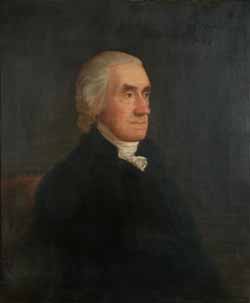The Trial of Nero Faneuil
Nero Faneuil was a black man who petitioned for an end to slavery in Massachusetts in 1777, as quoted here. It’s unclear whether he was enslaved at the time or advocating for the many other people who were.
Seven years later, Nero Faneuil (his surname pronounced and often spelled as “Funnel”) was locked up on suspicion of two robberies in Boston: of a chest containing important papers and cash from the house of Continental official James Lovell, and of dry goods from the shop of John Fullerton.
Of the two crimes, the first was far more serious. As the 2 Dec 1784 Massachusetts Spy said:
The attorney general of Massachusetts was Robert Treat Paine (shown above). His papers, as published by the Massachusetts Historical Society, are our fullest source on what happened next. At the grand jury proceedings in February 1785, all three men pled not guilty, and their trial was scheduled for 3 March.
Prospects looked bleak for Nero Faneuil. He was charged with two thefts instead of just one. Testimony established that “no part of the Property [from Lovell was] found on any but Nero.” And he was the only black man arrested.
But I think Faneuil also had an important asset: he was local. People in town knew him. According to Paine’s notes, Benjamin Hichborn testified, “Nero’s Character for Truth good.” [I think Hichborn was a slippery character himself, but he was a genteel, well-connected lawyer.] In contrast, Archibald and Scott had recently drifted into town from the south.
In addition, Faneuil seized an opening. Lovell was anxious to locate his stolen papers. He asked Scott on “the day after they were cmtted” where those were, and recalled that Scott answered “that the negro was the only person who could give me informn.” Lovell then went to Faneuil, who testified, “Mr. Lovel told me if I wd. Confess I should be a Witness.” Faneuil therefore turned state’s evidence against Archibald and Scott.
But first, Faneuil pled guilty to the Fullerton theft. The court sentenced him to be branded on the forehead with the letter “B” for “burglar.” It also ordered him to restore Fullerton’s goods and pay £84 as treble damages, which everyone must have known was beyond his means. Faneuil declared that he couldn’t pay, and the court sentenced him to serve Fullerton for seven years. He was thus thrown back into servitude.
TOMORROW: At the trial.
Seven years later, Nero Faneuil (his surname pronounced and often spelled as “Funnel”) was locked up on suspicion of two robberies in Boston: of a chest containing important papers and cash from the house of Continental official James Lovell, and of dry goods from the shop of John Fullerton.
Of the two crimes, the first was far more serious. As the 2 Dec 1784 Massachusetts Spy said:
It is reported that two persons are taken up in Boston, and committed to gaol, on suspicion of breaking open the house of the Hon. James Lovell, Esq; Continental Treasurer, in this State, and robbing him of 25,000 dollars in Loan-Office certificates, &c.Faneuil was charged with that crime alongside two white men, Thomas Archibald and William Scott. For the other crime, of stealing from Fullerton’s shop, Faneuil was charged alone.
The attorney general of Massachusetts was Robert Treat Paine (shown above). His papers, as published by the Massachusetts Historical Society, are our fullest source on what happened next. At the grand jury proceedings in February 1785, all three men pled not guilty, and their trial was scheduled for 3 March.
Prospects looked bleak for Nero Faneuil. He was charged with two thefts instead of just one. Testimony established that “no part of the Property [from Lovell was] found on any but Nero.” And he was the only black man arrested.
But I think Faneuil also had an important asset: he was local. People in town knew him. According to Paine’s notes, Benjamin Hichborn testified, “Nero’s Character for Truth good.” [I think Hichborn was a slippery character himself, but he was a genteel, well-connected lawyer.] In contrast, Archibald and Scott had recently drifted into town from the south.
In addition, Faneuil seized an opening. Lovell was anxious to locate his stolen papers. He asked Scott on “the day after they were cmtted” where those were, and recalled that Scott answered “that the negro was the only person who could give me informn.” Lovell then went to Faneuil, who testified, “Mr. Lovel told me if I wd. Confess I should be a Witness.” Faneuil therefore turned state’s evidence against Archibald and Scott.
But first, Faneuil pled guilty to the Fullerton theft. The court sentenced him to be branded on the forehead with the letter “B” for “burglar.” It also ordered him to restore Fullerton’s goods and pay £84 as treble damages, which everyone must have known was beyond his means. Faneuil declared that he couldn’t pay, and the court sentenced him to serve Fullerton for seven years. He was thus thrown back into servitude.
TOMORROW: At the trial.


No comments:
Post a Comment